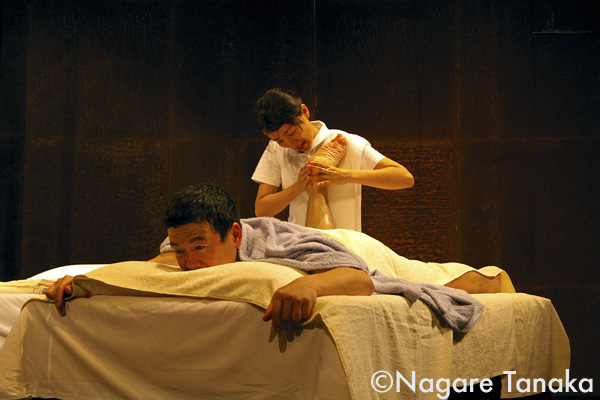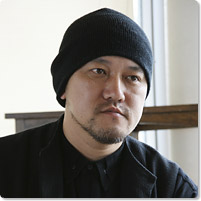One night in May, Nojima, the front desk attendant at this hot spring resort spa on the Japan Sea coast, is explaining the hotel’s facilities to a middle-aged male guest named Aimoto, who has arrived late at night for a stay. Noshima guides Aimoto to his room, and as soon as he leaves, Aimoto makes a call on his mobile phone. He appears to be calling someone that he has already arranged a rendezvous with at the hotel and the person replies that she is in her car and will soon arrive at the hotel.
Relieved to know that the person is on the way, Aimoto calls room service to order champagne and such and gets angry when he is told that room service ended at 10:00 p.m. Next, he asks for a masseuse and is once again refused, being told that getting one this late at night is not possible. The hotel’s young matron, Inaba, apologizes profusely, but Aimoto’s anger only increases. At that point the room’s doorbell rings. It is the hotel’s masseuse, Setsuko.
There is an absent, far-off air to this masseuse Setsuko, and the young matron, Inaba, leaves the room with a somewhat unsettling comment: “If anything suspicious happens, don’t hesitate to call the front desk.”
Aimoto chooses the 40-minute full-body massage. As Setsuko begins to work her hands into Aomoto’s back a “conversation” begins between the two. Speaking in a soft, steady drone as she massages him, Setsuko describes the causes of the stiffness and cold spots of Aimoto’s body and the various pains he feels. Her words seemed to unwind the tension not in his body but in his soul. Stunned by this revelation, we begin to see a change in heart in Aimoto.
During the massage Aimoto’s mobile phone is ringing from time to time. The person who is on her way to meet Aimoto at the hotel seems to have forgotten something and wants to go back to get it. He coaxes her to just come to the hotel as quickly as possible. After an unproductive exchange of words, it appears that the person has said she will not be going to the hotel.
Aimoto cries out in anguish. The woman he has been talking to on the phone is one, like himself, who has grown tired of life. Although their reasons differed, the two had promised to meet at the hotel and end their lives together. In the final moment of truth, however, the woman has broken that promise.
To Setsuko, who continues the massage as if nothing has happened, Aimoto asks, “Will
you
die with me?” “It’s fine with me,” Setsuko replies. “But on the one condition. Let me work out your remaining tight spots first.”
As Setsuko switches to an oil massage a new “conversation” begins. Aimoto begins talking about how the small company he had worked at for many years had gone bankrupt and left him with a large debt as one of the company’s joint underwriters; how his wife and daughter had deserted him coldly with this change of fortune; and how he had been handed a sum of money and told never to come again when he had gone to the home of his wife’s parents hoping only to see her and his daughter for a few moments.
Then Setsuko begins to tell her own story in her quiet mumble: how her husband who had worked at this hotel had been unfaithful to her; how she had learned the skills of a masseuse in order to make a living after her husband left; how she had been unable to give her daughter the love she needed in the busy days of work as the hotel masseuse; how she had finally decided to quit the job for the sake of her daughter, only to have her daughter die; and finally, how she had unsuccessfully tried to commit suicide herself.
The two tragic protagonists Aimoto and Setsuko would appear to have lost everything in their lives. Still, in the small but palpable warmth of the masseuse’s hands against the back muscles of the man, the two find a thread of hope.



